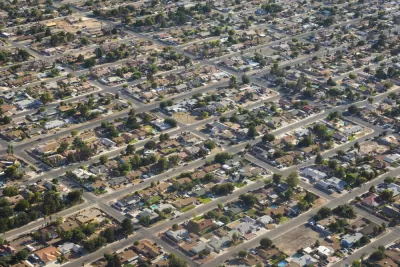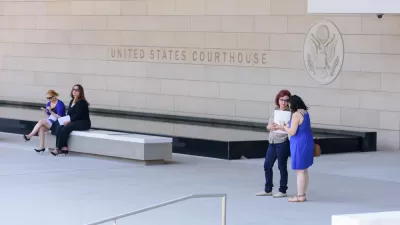In the United States, rates of homeownership among Latino families lag far behind those of white families. A recent article from the Urban Institute digs into the causes and effects of this issue.

Even as the Latino population of the United States grows, their home ownership lags persistently behind whites. In an article on the Urban Institute's website Jim Parrott writes, "According to the American Community Survey, only 45 percent of Hispanic households owned their homes in 2013 compared with 71 percent of whites." Parrot argues that the reasons for this disparity are multiple. One reason is the heads of Latino families are on average younger than the heads of white families and younger people generally have lower credit scores than their older peers. It's difficult to know if there are racial disparities in credit scores because as Parrot explains, "Publicly available numbers for credit scores by ethnicity are difficult to come by, we do know that Hispanic borrowers on average have lower credit scores than do white borrowers"
Still, Parrot argues, credit represents only part of the problem, in his view the main problem is the availability of "good jobs." "The answer is, instead, to increase the number of families who are in the financial position to be homeowners and to ensure that the market effectively serves all who are." A more inclusive economy would go a long way towards alleviating this problem.
Regardless of the cause, the effect of this disparity could be disastrous. "We need to recognize that the face of the nation is changing, and our housing market will inevitably change with it." If Hispanics are left out of home ownership, the housing market could contract significantly. Making the country that much more unequal.
FULL STORY: Why the low Hispanic homeownership rate matters

Planetizen Federal Action Tracker
A weekly monitor of how Trump’s orders and actions are impacting planners and planning in America.

Restaurant Patios Were a Pandemic Win — Why Were They so Hard to Keep?
Social distancing requirements and changes in travel patterns prompted cities to pilot new uses for street and sidewalk space. Then it got complicated.

Map: Where Senate Republicans Want to Sell Your Public Lands
For public land advocates, the Senate Republicans’ proposal to sell millions of acres of public land in the West is “the biggest fight of their careers.”

Maui's Vacation Rental Debate Turns Ugly
Verbal attacks, misinformation campaigns and fistfights plague a high-stakes debate to convert thousands of vacation rentals into long-term housing.

San Francisco Suspends Traffic Calming Amidst Record Deaths
Citing “a challenging fiscal landscape,” the city will cease the program on the heels of 42 traffic deaths, including 24 pedestrians.

California Homeless Arrests, Citations Spike After Ruling
An investigation reveals that anti-homeless actions increased up to 500% after Grants Pass v. Johnson — even in cities claiming no policy change.
Urban Design for Planners 1: Software Tools
This six-course series explores essential urban design concepts using open source software and equips planners with the tools they need to participate fully in the urban design process.
Planning for Universal Design
Learn the tools for implementing Universal Design in planning regulations.
Heyer Gruel & Associates PA
JM Goldson LLC
Custer County Colorado
City of Camden Redevelopment Agency
City of Astoria
Transportation Research & Education Center (TREC) at Portland State University
Camden Redevelopment Agency
City of Claremont
Municipality of Princeton (NJ)





























